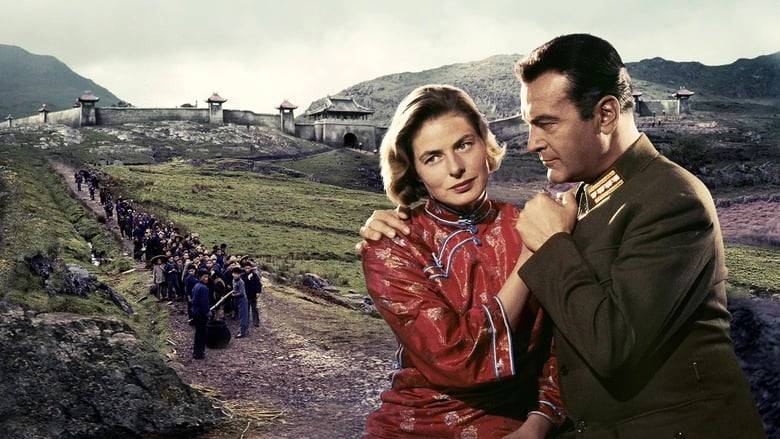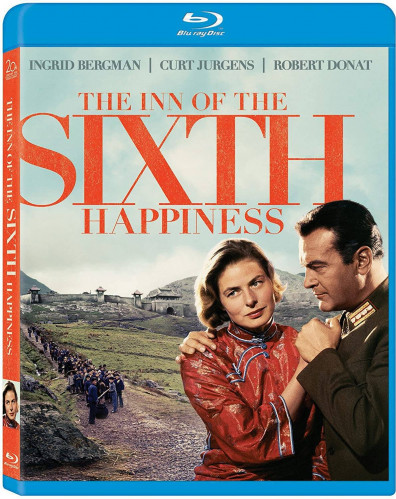THE INN OF THE SIXTH HAPPINESS [1958 / 2014] [Blu-ray] [USA Release] The Unforgettable Story of the Girl Who Defied the Might of the Japanese Invasion of China!
This sweeping, inspiring film, directed by Mark Robson and starring the three-time Oscar® Winner Ingrid Bergman and is brought to us in a breath-taking Blu-ray disc for the first time. An English maid Gladys Aylward [Ingrid Bergman] serving as a missionary in China wins the respect of a curmudgeonly local Mandarin of Yang Cheng [Robert Donat] and the love of a Chinese army officer Captain Lin Nan [Curt Jürgens]. When the Japanese invade the area, however, her commitment is put to the ultimate test, as she must lead the children of an entire village to safety, in this beloved classic, based on a true story.
FILM FACT No1: 1958 National Board of Review, USA: Win: NBR Award for Best Actress for Ingrid Bergman. Nominated: Special Citation for Robert Donat [Posthumously]. 1959 Academy Awards® Nominated: Best Director for Mark Robson. 1959 Golden Globes: Win: Best Film Promoting International Understanding. Nominated: Best Actress in a Drama for Ingrid Bergman. Nominated: Best Actor in a Drama for Robert Donat [Posthumously]. 1959 BAFTA Awards: Nominated: BAFTA Film Award for Best Foreign Actor for Curd Jürgens. Nominated: BAFTA Film Award for Best Foreign Actress for Ingrid Bergman. Nominated: BAFTA Film Award for Best British Screenplay for Isobel Lennart. 1959 Directors Guild of America: Nominated: DGA Award for Outstanding Directorial Achievement in Motion Pictures for Mark Robson.
FILM FACT No2: Actor Robert Donet passed away before the film’s release, making his final words in the film, “We shall not see each other again, I think. Farewell” very prophetic. Ironically, it was also producer Buddy Adler's final film; he passed away as production ended on 12th July, 1958. The film was the second most popular film at the British box office in 1959. The film was shot in Britain. Snowdonia in North Wales was used for exterior locations. Most of the children in the film were Chinese children from Liverpool, home to one of the oldest Chinese communities in Europe. Gladys Aylward opened a children's orphanage in Taiwan in 1958 and continued to run it until her death in 1970. Considered a national hero in that country, she nevertheless was deeply embarrassed by the film and regarded it as having "soiled" her reputation.
Cast: Ingrid Bergman, Curt Jürgens, Robert Donat, Michael David, Athene Seyler, Ronald Squire, Moultrie Kelsall, Richard Wattis, Peter Chong, Tsai Chin, Edith Sharpe, Joan Young, Lian-Shin Yang, Noel Hood, Burt Kwouk, Chris Adcock (uncredited), Frank Blaine (uncredited), Alexis Bobrinskoy (uncredited), Edwina Carroll (uncredited), Christopher Chen (uncredited), Lin Chen (uncredited), David Goh (uncredited), Frank Goh (uncredited), Ursula Granville (uncredited), George Holdcroft (uncredited), Ronald Kyaing (uncredited), Judith Lai (uncredited), Ronald Lee (uncredited), Aileen Lewis (uncredited), Louise Lin (uncredited), Jack Mandeville (uncredited), Alf Mangan (uncredited), Richard Marner (uncredited), André Mikhelson (uncredited), Stanislaw Mikula (uncredited), Aung Min (uncredited), Mitch Mitchell (uncredited), Philip Needs (uncredited), Reg Thomason (uncredited), Myo Toon (uncredited), Michael Wee (uncredited), Vincent Wong (uncredited), Woffles Wu (uncredited), Ye-Min (uncredited), Ric Young (uncredited), Zed Zakari (uncredited) and Stanley Zevic (uncredited)
Director: Mark Robson
Producer: Buddy Adler
Screenplay: Isobel Lennart (screenplay) and Alan Burgess (novel "The Small Woman")
Composer: Malcolm Arnold
Cinematography: Frederick A. Young, O.B.E., B.S.C. (Director of Photography)
Image Resolution: 1080p (Color by DeLuxe)
Aspect Ratio: 2.35:1 (CinemaScope)
Audio: English: 4.0 DTS-HD Master Audio
Spanish: 1.0 Dolby Digital Mono Audio
French: 1.0 Dolby Digital Mono Audio
Italian: 2.0 DTS-HD Audio
English: 2.0 Dolby Digital Stereo Audio
Subtitles: English SDH, Spanish, Japanese and Italian
Running Time: 158 minutes
Region: All Regions
Number of discs: 1
Studio: Fox Searchlight
Andrew’s Blu-ray Review: Alan Burgess' novel “The Small Woman” was adapted by 20th Century-Fox as ‘THE INN OF THE SIXTH HAPPINESS’ [1958]. In the film, English housemaid Gladys Aylward [Ingrid Bergman] realises her childhood dream of becoming a missionary by using her life savings to go to the mountains of China. There, she helps a missionary Jeannie Lawson [Athene Seyler] start an inn at a remote mule crossing and saves 100 children during the Sino-Japanese War in 1936. The casting was Hollywood International Ingrid Bergman, a Swede, played an English maid and Englishman Robert Donat played a Mandarin who at first resents Ingrid Bergman and later converts to Christianity in her honour. Scotsman Sean Connery was considered for the role eventually given to the Austrian Curt Jürgens a Eurasian Captain Lin Nan army officer whose romance with Ingrid Bergman is interrupted when she must flee with the children from the village when the Japanese invade.
The major Hollywood studios used every trick in the book to lure audiences away from their freshly minted televisions during the 1950s, developing such technical processes as Cinerama, CinemaScope, and 3D; constructing massive spectacles around historical, religious, and inspirational themes; and taking viewers to faraway exotic locales that looked sublime when presented in brilliant colour and splashed across a wide theatrical screen. ‘THE INN OF THE SIXTH HAPPINESS’ employs all these components as it chronicles the true-life adventures, hardships, and personal development of Gladys Aylward [Ingrid Bergman], a passionate Englishwoman who feels duty-bound to perform missionary work in the wilds of underdeveloped China. Mark Robson, who directed the sultry soap opera ‘Peyton Place’ the preceding year, takes the high road here, with the tale of epic proportions and canonising his heroine. While Gladys Aylward is unquestionably an admirable figure worthy of a biopic, this mammoth, somewhat fictionalised treatment would most likely make its humble, diminutive subject blush with embarrassment.
It also tests the endurance of the viewer. Clocking in at 158 minutes, ‘THE INN OF THE SIXTH HAPPINESS’ takes a leisurely approach, but lacks the kind of vital narrative drive and visual panache necessary to rivet audience attention. The film is never dull per se, but it plods and creaks along, only becoming truly exciting during its third hour. Is Gladys Aylward's life really fascinating enough to merit such a lavish treatment? I'd say no, but in the 1950s, this was the sort of fare moviegoers ravenously gobbled up, and their voracious appetite kept the studio coffers well fed.
Hard work, plenty of sacrifice, and an arduous journey on the Trans-Siberian railway brings Gladys Aylward to China, where she is mentored by the established yet eccentric missionary Jeannie Lawson [Athene Seyler], who reveals to Gladys the five types of happiness, wealth, longevity, good health, virtue, and a peaceful death in old age. The sixth happiness, she says, “is determined by one's own heart.” After her apprenticeship and Lawson's death, Gladys takes over the inn, a sanctuary for travellers who are lured by good food and comfortable lodgings, then subjected to a series of Bible stories in the hope of fostering some religious fervour. Though Captain Lin Nan [Curt Jürgens], an intelligence officer seeking to speed China's unification, classifies missionaries as "the most frightening kind of foreign devil," Gladys Aylward gains the respect of the local people, who rename her Jen-Ai and the one who cares for others. And that respect brings her to the attention of the region's governor, The Mandarin of Yang Cheng [Robert Donat], who enlists her services to help enforce social improvements (including the banning of the ancient tradition of female foot binding) throughout the province, and even quell a violent prison riot.
As Gladys Aylward settles into her satisfying life, an attraction develops between her and Lin Nan, who is tormented by his mixed Eurasian blood. "In your world, I can only be a second class citizen," he tells Gladys. "I chose China, because here I am allowed to be of value." Their blossoming relationship, however, is short circuited by a Japanese attack, which destroys their village and sends Gladys Aylward on a treacherous journey to safety across a remote mountain range with 100 orphan children in tow.
As with most biopics, the script condenses, consolidates, embellishes, and fictionalises events for dramatic effect, but 'The Inn of the Sixth Happiness' keeps itself largely grounded in fact. It's impossible not to be impressed by Gladys Aylward gumption, determination, and refusal to accept failure, compassion, strength, and selflessness. Though she's really too good to be true, Ingrid Bergman makes her accessible and relatable, portraying her not as a saint, but as a sincere woman with an unwavering purpose. Reportedly, Gladys Aylward was adamantly against Ingrid Bergman's casting, citing the actress' immorality a decade before when she left her husband and daughter in Hollywood to embark on a passionate, illicit affair with Italian director Roberto Rossellini, which resulted in a pregnancy out of wedlock, Ingrid Bergman's denouncement by Congress, and a European exile. Gladys Aylward couldn't condone or forgive such behaviour, and didn't approve of Ingrid Bergman's heartfelt portrayal or even the film itself. Few performers, however, look as comfortable and unaffected in front of the camera as Ingrid Bergman, and she certainly does the role proud.
Unfortunately, the 1950s also was an age when Hollywood refused to cast ethnic actors in substantial ethnic parts. As a result, the Englishman Robert Donat and German Curt Jürgens plays a Chinese men, and their Asian makeup and dialect is jarring, to say the least. Neither actor disrespects the race (remember Mickey Rooney's cringe-inducing caricature in 'Breakfast at Tiffany's’), but they still make it difficult to fully suspend our disbelief. Much to the film's detriment, Curt Jürgens and Ingrid Bergman generate no sparks whatsoever, and though Curt Jürgens ' work is quite genuine, an uncomfortable stiffness permeates it. Robert Donat crafts a more finely etched portrayal made all the more poignant by the fact that ‘THE INN OF THE SIXTH HAPPINESS’ marked his final performance. The man who made his name in Alfred Hitchcock's 'The 39 Steps' [1935] and won an Oscar® for 'Goodbye Mr. Chips' [1939] passed away from complications from severe asthma at the tender age of 53 while the film was still in production.
It is tough to believe that ‘THE INN OF THE SIXTH HAPPINESS’ ranks as one of 1958's top grossing motion pictures (and garnered a Best Director Academy Award® nomination for Mark Robson). Its lead character may be an extraordinary woman in many respects, but too often the film tells her story in a mundane manner that lacks pizzazz. Considering the film profiles an intensely spiritual woman, it is ironic its major missing element is spirit. Ingrid Bergman tries her best, but even her considerable talents and inner radiance can't always carry this huge production.
THE INN OF THE SIXTH HAPPINESS MUSIC TRACK LIST
THE CHILDREN'S MARCHING SONG (THIS OLD MAN) (Traditional) (Arranged by Malcolm Arnold) [Sung by Ingrid Bergman and a children's chorus]
ONWARD CHRISTIAN SOLDIERS (Traditional) (Music by Arthur Sullivan) (lyrics by Sabine Baring-Gould) [Sung by Ingrid Bergman on the Trans-Siberian Train]
* * * * *
Blu-ray Image Quality – With its rugged locations (who cares if it's really England rather than China) and exotic feel, ‘THE INN OF THE SIXTH HAPPINESS’ film deserves a top-notch transfer to capture the story's foreign atmosphere. Fox Searchlight’s 1080p image rendering does a decent job, but such elements as single-strip colour and inconsistent grain keep it from achieving the hoped-for heights. Clarity and contrast are quite good; the image sports a fair amount of depth and background details are crisp and distinct. Director Mark Robson fills the CinemaScope frame well, making the extreme wide angle seems natural, but a nagging drabness afflicts the picture and keeps it from achieving the vibrancy we crave. Hues are a bit wan (a symptom of single-strip colour), but some of the reds in the Chinese gowns are lush and bold. Orange flames also achieve a good degree of saturation, while sky and foliage colours vary ever so slightly throughout the lengthy running time. Black levels are solid and deep, shadow delineation is fine, and flesh tones, for the most part, are stable and true. Close-ups lack the razor sharpness that distinguishes the best transfers, but they still highlight facial features well. The early London scenes and the travel montage possess a higher grain quotient than the film's China portion, but the entire movie exudes a lovely celluloid feel. No digital doctoring seems to have been applied, and no defects detract from our overall enjoyment of this sweeping motion picture.
Blu-ray Audio Quality – The 4.0 DTS-HD Master Audio track supplies wonderfully nuanced sound with an abundance of surround activity. Atmospherics bleed nicely into the rears, and mild stereo separation up front creates a wide aural expanse that complements the film's epic nature well. The beautiful, lyrical theme music by Malcolm Arnold, who also scored 'The Bridge on the River Kwai' the previous year, contains subtle bits of surround shading, and is distinguished by excellent fidelity and fine tonal depth. A wide dynamic scale handles all the highs and lows with ease, although the lack of a spacious channel minimises the impact of bass frequencies, especially during the Japanese aerial attacks. Exploding bombs and plane engines sound rather anaemic, robbing the film's spectacle scenes of critical oomph.
* * * * *
Blu-ray Special Features and Extras:
Audio Commentary with Nick Redman, Aubrey Solomon and Donald Spoto: Film experts Nick Redman and Aubrey Solomon, along with Ingrid Bergman biographer Donald Spoto, all contribute to an involving, articulate commentary that really gets under the film's veneer. Nick Redman handles the historical chores, providing background on the political, military, and social upheavals that affected China during the 1930s and 1940s. He also talks at length about the real Gladys Aylward and the numerous ways her actual story differs from the film treatment of it. (Surprisingly, we learn much more about Gladys Aylward from this commentary track than we do watching the film.) Aubrey Solomon covers the production's nuts and bolts in a no-nonsense fashion, while Donald Spoto provides an intimate portrait and extols the many virtues of Bergman, whom he knew well during the latter stages of her life. Among other things, we learn about the futile attempts to shoot the movie on location in Taiwan (the rugged countryside of Wales was used instead), all the hardships and atrocities Gladys Aylward endured that weren't remotely alluded to in the script, and how the free-spirited Ingrid Bergman rose from the ashes of an international scandal to reclaim her career and once again become a top box office star. Though it's difficult to maintain listener interest over the course of two hours and 40 minutes, this trio does a nice job, helping us gain a greater appreciation for both Gladys Aylward and the film that depicts an important stage of her life.
Special Feature: Fox Movietone News: ‘THE INN OF THE SIXTH HAPPINESS’ Rapturous and World Premiere [1958] [480i] [1.37:1] [2:09] Two clips, each running a scant minute, cover the film's Domestic and World Premieres. Stars such as Danny Kaye, Jill St. John, and Red Buttons attend the London Premiere opening, while Jayne Mansfield, Mitzi Gaynor, Robert Wagner, and Natalie Wood can be glimpsed at the Hollywood premiere.
Theatrical Trailers [1958] [480i] [1.37:1] [6:17] ‘THE INN OF THE SIXTH HAPPINESS’ film's original preview is introduced and partially narrated by Ingrid Bergman. A Spanish trailer is also included, which is identical to the English one, except for its Spanish subtitles.
Finally, the always luminous Ingrid Bergman lifts ‘THE INN OF THE SIXTH HAPPINESS’ above other 1950s historical epics, but even her fine work can't totally salvage this bloated inspirational tale about a brave and stubborn missionary who helps bring China into the modern age. Too much Hollywood and not enough authenticity lend the film a dated feel, and the leisurely pacing often tries viewer patience. Still, the unselfish heroics of the main character earn our admiration and make the experience worthwhile. Fox Searchlight's Blu-ray presentation skimps a bit on supplements, but features solid video and audio transfers that bring this large-scale drama to life. Bergman fans will certainly want to add this disc to their collection, but others should check it out first before making a purchase, due to the picture's limited appeal. ‘THE INN OF THE SIXTH HAPPINESS’ might not warrant an extended stay, but it's worth a look, especially for classic film aficionados. Again, with other films I have reviewed that were released at the same time of this film, are a wonderful period we do not see in the 21st Century and when I originally saw this film released in the cinema, I loved everything about the subject and the actors who appeared on the screen and I was so excited when the is Blu-ray was going to be released and now I have a beautiful film, that again is character driven and that is why it has gone pride of place in my Blu-ray Collection and I hope my review has given you an incentive to purchase this disc. Highly Recommended!
Andrew C. Miller – Your Ultimate No.1 Film Aficionado
Le Cinema Paradiso
United Kingdom



